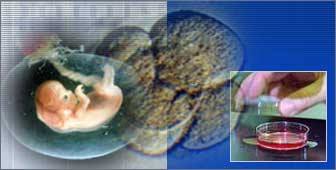Stem cell report reveals legal maze

As Switzerland gears up to legislate on stem cell research, a new study has highlighted some of the ethical and legal implications of this controversial field.
In an interim report published by the Centre for Technology Assessment in Bern, experts have focused on the anomalies in Swiss law.
Switzerland has some of the most stringent laws in the world on research into human embryos but these relate principally to fertilisation and reproduction and were drawn up before the concept of stem cell research was thought of.
The final version of the report, which is designed to help political decision-makers, is due to be published in the autumn.
Regulation
“I think it’s very important that we have a public debate and also that we are willing to regulate this field of research,” said the study’s co-author, Rainer Schweizer, professor of public law at St Gallen university.
Schweizer said that the central question, which needed to be resolved, was whether to allow research on stem cells from embryos left over after in vitro fertilisation treatment.
“It’s very important to know that our constitution offers protection for the first period of human life,” he said. “The legislators have to resolve the question of what to do with embryos without a chance for implantation and without a chance to life.”
Grey areas
“Many grey areas need to be regulated,” added Dr Margrit Leuthold, secretary general of the Swiss Academy of Medical Sciences, who participated in the study. “Science is developing in a fashion which is not always foreseeable.”
Last August, the Academy’s ethics commission endorsed research on surplus human embryos produced by in vitro fertilisation.
“Research is something which happens worldwide,” said Leuthold. “If researchers in a country cannot follow researchers in other countries, especially in this field of biomedical sciences, where Switzerland still has a number one position in certain areas, it could be a damage and a loss for Switzerland as a place of research.”
Britain allows medical research into stem cells from human embryos while other countries, including the United States, Israel and Australia, are leading producers of these cells.
Exchange of information
The Centre for Technology Assessment is attached to the Swiss Science and Technology Council, which advises the Federal Council on scientific and technological issues.
During the next three weeks in Lausanne, Bern, Lugano, Thun and Winterthur, the Centre is holding a series of PubliForums on the question of stem cell research designed to promote the exchange of information and opinions between specialists and the public at large.
“There will probably be some considerable changes when we have the final report in September or October,” said Sergio Belluci, director of the centre for Technology Assessment. “What is missing in this report is all the social impact. There will also be a final recommendation.”
by Vincent Landon

In compliance with the JTI standards
More: SWI swissinfo.ch certified by the Journalism Trust Initiative








You can find an overview of ongoing debates with our journalists here . Please join us!
If you want to start a conversation about a topic raised in this article or want to report factual errors, email us at english@swissinfo.ch.